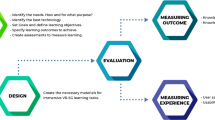Abstract
Many serious games have been reported in the literature to help children with special needs on learning and education. Such serious games are embodied with various forms of technologies such as virtual reality, tablets and 3D computer graphics. Different pedagogical theories are also applied in serious games. Evaluation of the effectiveness of serious games varies from qualitative methods to quantitative methods. A virtual pink dolphin (VPD) serious game has been developed in the prior work by the research team at Nanyang Technological University. This chapter describes a preliminary investigation on the effectiveness of VPD serious game for children with special needs. An experiment is conducted with a small number of children from a special needs school in Singapore. They go through two experiment sessions each with three game levels.
Access this chapter
Tax calculation will be finalised at checkout
Purchases are for personal use only
Similar content being viewed by others
References
Bevans, R.: An introduction to t-tests (2020). https://www.scribbr.com/statistics/t-test
Cai, Y., Chia, K., Thalmann, D., Kee, K., Zheng, J., Thalmann, N.: Design and development of a virtual dolphinarium for children with autism. IEEE Trans. Neural Syst. Rehabil. Eng. 21(2), 208–217 (2013). https://doi.org/10.1109/TNSRE.2013.2240700
Cai, Y., Chiew, R., Nay, Z.T., Indhumathi, C., Huang, L.: Design and development of VR learning environments for children with ASD. Interact. Learn. Environ. 25(8), 1098–1109 (2017). https://doi.org/10.1080/10494820.2017.1282877
Fiksdal, B.L., Houlihan, D., Barnes, A.C.: Dolphin-assisted therapy: claims versus evidence. Autism Res. Treat. (2012). https://doi.org/10.1155/2012/839792
Kenton, W.: Tools for fundamental analysis, t-test (2020). https://www.investopedia.com/terms/t/t-test.asp
Loh, C.S., Sheng, Y., Ifenthaler, D.: Serious games analytics-methodologies for performance measurement, assessment, and improvement. Springer International, New York (2015)
Roediger, H., Karpicke, J.: Test-enhanced learning. Psychol. Sci. 17(3), 249–255 (2006). https://doi.org/10.1111/j.1467-9280.2006.01693.x
Salgueiro, E., Nunes, L., Barros, A., Maroco, J., Salgueiro, A.I., Dos Santos, M.E.: Effects of a dolphin interaction program on children with autism spectrum disorders: an exploratory research. BMC Res. Notes 5, 199 (2012). https://doi.org/10.1186/1756-0500-5-199
Schottelkorb, A.A., Swan, K.L., Ogawa, Y.: Intensive child-centered play therapy for children on the autism spectrum: a pilot study. J. Counsel. Dev. 98(1), 63–73 (2020). https://doi.org/10.1002/jcad.12300
Tahiri, N., El Alami, M.: A new evaluation technique through serious games for children with ASD. Int. J. Emerg. Technol. Learn. (iJET) 15(11), 202 (2020). https://doi.org/10.3991/ijet.v15i11.12843
Tang, J., Falkmer, M., Chen, N., Bölte, S., Girdler, S.: Designing a serious game for youth with ASD: perspectives from end-users and professionals. J. Autism Dev. Disord. 49(3), 978–995 (2019). https://doi.org/10.1007/s10803-018-3801-9
The Pennsylvania State University: Hypothesis testing (2020). https://online.stat.psu.edu/statprogram/reviews/statistical-concepts/hypothesis-testing/p-value-approach
Acknowledgements
The authors would like to thank the students, teachers, staffs, principal and parents of AWWA School for their support, help and feedback in this research work. Thanks also go to the Institute for Media Innovation at NTU and Singapore Millennium Foundation for their funding support.
Author information
Authors and Affiliations
Corresponding author
Editor information
Editors and Affiliations
Rights and permissions
Copyright information
© 2021 The Author(s), under exclusive license to Springer Nature Singapore Pte Ltd.
About this chapter
Cite this chapter
Chan, S.MY., Cao, Q., Chen, J., Cai, Y. (2021). Evaluation of Serious Games for Special Needs Education. In: Cai, Y., Cao, Q. (eds) When VR Serious Games Meet Special Needs Education. Gaming Media and Social Effects. Springer, Singapore. https://doi.org/10.1007/978-981-33-6942-9_7
Download citation
DOI: https://doi.org/10.1007/978-981-33-6942-9_7
Published:
Publisher Name: Springer, Singapore
Print ISBN: 978-981-33-6941-2
Online ISBN: 978-981-33-6942-9
eBook Packages: Intelligent Technologies and RoboticsIntelligent Technologies and Robotics (R0)




